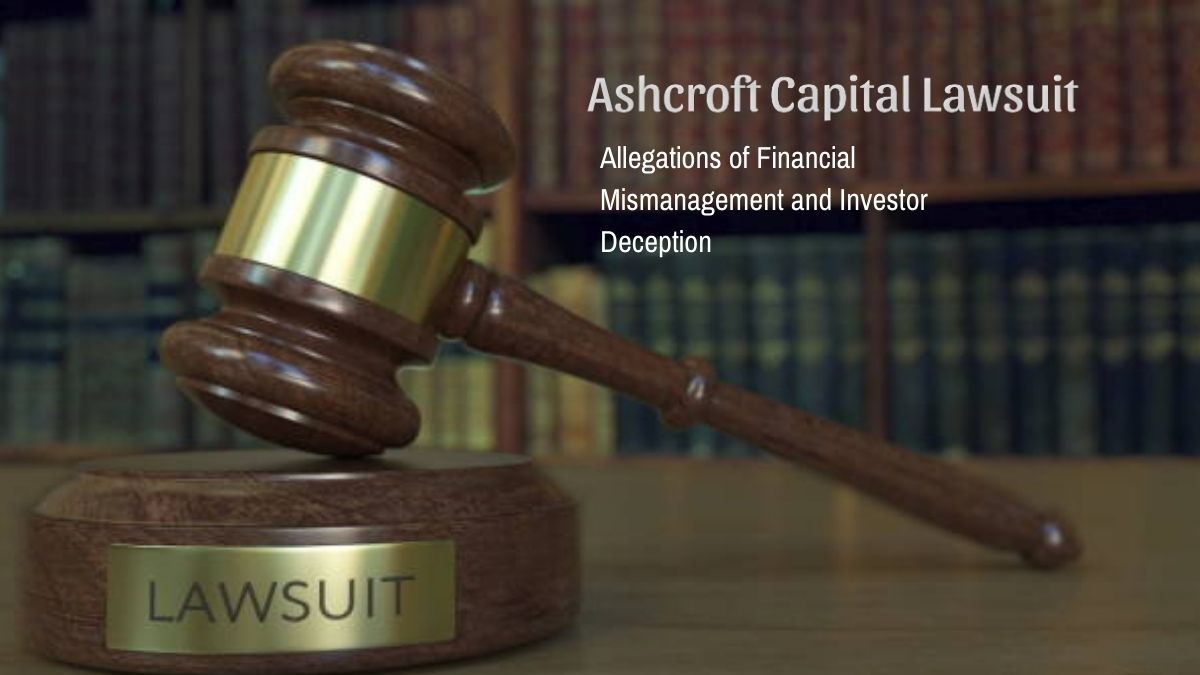LAW
Ashcroft Capital Lawsuit Explained: Allegations of Financial Mismanagement and Investor Deception

The Ashcroft Capital lawsuit has taken on a prominent position as a major legal dispute in the realm of real estate investments. Investors have made public their concerns about how the firm allegedly mismanaged money while presenting inaccurate financial data and failing to act with proper duty. The following article explores every essential aspect of the Ashcroft Capital lawsuit while detailing affirmation points and possible conclusions to clarify why these claims are sparking real estate investment industry commotion.
What Is Ashcroft Capital? A Background on the Real Estate Investment Firm
Since its establishment in 2015, Ashcroft Capital has formed as a real estate investment company dedicated to acquiring and managing multifamily properties within strategic U.S. markets to give investors reliable results from property value increases and rental cash flow. Through excellence in investment opportunities, Ashcroft Capital has established itself as an organization that attracts individual and institutional investors because of the skillful leadership of its founders. A current legal dispute has exposed issues regarding the company’s financial operations, which led to major investor money problems through deceptive forecasting and trust violations.
What Triggered the Ashcroft Capital Lawsuit?
Numerous investors have taken legal action against Ashcroft Capital because the company did not fulfill its monetary commitments. Ashcroft Capital produced deceptive financial forecasts, which led investors to invest based on unrealistic profit expectations. Investors filed a lawsuit against Ashcroft Capital following the release of actual financial results that were lower than their forecasts.
Several specific events appear to have triggered the lawsuit, including:
- A series of property acquisitions by Ashcroft Capital failed to meet the projected financial targets.
- Allegations that certain fees were not disclosed to investors upfront, leading to concerns over the firm’s transparency.
- Claims of inflated property valuations that contributed to unrealistic projections.

Allegations of Financial Mismanagement: What Investors Are Claiming
- Financial mismanagement is at the heart of the Ashcroft Capital lawsuit. Investors argue that the firm misrepresented its ability to manage properties efficiently, leading to unrealistic expectations about the returns they could expect.
- They also claim that funds were poorly allocated, with investment dollars not being used in the manner that was originally promised or outlined in the investment proposals.
- For example, some investors allege that properties were poorly maintained, and renovations were not completed as promised, causing the properties to underperform financially.
- As a result, investors argue that Ashcroft Capital’s financial management practices were not up to industry standards, leading to significant financial losses.
Misleading Financial Projections: Setting Unrealistic Expectations
A severe complaint targets Ashcroft Capital for its deceptive financial forecasting practices given to the investing public. The legal complaint states that the company displayed false return forecasts by using unrealistically high number predictions in all revenue streams, including property valuation and rental income, as well as market expansion calculations.
The projected financial information presented to investors proved to be unrealistic, overlooking crucial market risks such as economic recessions and changes in local real estate conditions. The false numbers gave investors reason to believe they had secured high-yield options, although the actual financial returns ultimately fell short of expectations.
Lack of Transparency in Fees and Expenses
A major component of the legal action concerns Ashcroft Capital’s failure to disclose the entire range of costs associated with investment fees. The Ashcroft Capital lawsuit alleges that Ashcroft Capital failed to disclose all fees associated with management expenses, including transaction costs, as well as undisclosed costs that could impact investment returns.
The lawsuit raises questions about whether Ashcroft Capital’s fee amounts matched typical prices in the real estate investment sector or if these fees were unjustifiably high. The lack of visible, detailed explanations regarding these costs has triggered accusations of financial fraud.
Concerns Over Inflated Property Valuations
Real estate investment heavily relies on property valuation, as it determines projected returns. The investors accuse Ashcroft Capital of manipulating property evaluations, which enables the company to report increased returns to shareholders.
Some investors say the properties received dishonest value distributions to boost impressionable return measurements. The inaccurate valuations of properties made investors perceive incorrect profit potential on their acquisitions.
The concern for investors stems from inflated property valuations because they alter true investment worth and create unachievable yield expectations that end in dissatisfied results after returns fail to materialize.
Legal Proceedings: Current Status of the Ashcroft Capital lawsuit
The court proceedings continue without a definitive judgment being reached at present. At the initial case stages, Ashcroft Capital maintained that their business strategies and market research stood on solid ground following industry norms. The plaintiffs demand monetary compensation that involves both reimbursement of investment losses and punitive damages.
This ongoing case will continue to receive public notice both for its particular claims against Ashcroft Capital and for its effects on the real estate investment sector. Law professionals anticipate the judgment to determine critical boundaries regarding investment company liability standards.
Potential Outcomes and Consequences for Ashcroft Capital
Ashcroft Capital will need to pay financial penalties to investors after court approval for their alleged mismanagement, combined with deceptive practices, that affected the investors. Ashcroft Capital may need to modify its operating procedures, combined with increased transparency, which will enhance its responsibility to investors throughout future investments.
Ashcroft Capital would suffer significant harm to its public image when working with investors because of this lawsuit. Future investments and client acquisition could become difficult for the firm if it is convicted of mismanagement and fraud.
Lessons for Investors: How to Protect Yourself from Similar Risks
Ashcroft Capital lawsuit highlights the importance of due diligence when investing in any firm, especially in complex sectors like real estate. Investors should always:
- Carefully examine the financial projections provided by the firm.
- Investigate fees and expenses to ensure full transparency.
- Assess the credibility and track record of the firm’s leadership.
- Ask about the valuation methods used for property acquisitions and ensure they are realistic.
Being proactive and vigilant can help investors avoid potential pitfalls and make more informed decisions.
Industry Impact: What This Case Means for Real Estate Investing
The Ashcroft Capital lawsuit causes the real estate investment community to experience severe shock because it challenges fundamental issues regarding corporate governance, along with investor protection. A successful lawsuit outcome would create a significant opportunity to reassess the real estate investment sector, thus increasing the level of rules and transparency in real estate markets.
The lawsuit might transform future real estate transaction structures, so businesses need to provide clear information regarding risks and all associated fees and projections.
Investor Reactions and Community Sentiment
The legal action against Ashcroft Capital received conflicting reactions from investors. The case produced different opinions among investors because some see the industry’s problems, yet others still back Ashcroft Capital, expecting them to win their court battle.
Investors show growing skepticism regarding opaque companies that fail to systematically account for business risks.
Final Thoughts: The Importance of Corporate Accountability
Ashcroft Capital litigation reveals how vital it is to hold investment companies accountable for their operations. Investors must require all financial firms under their trust to demonstrate complete transparency, accurate projection results, and solid ethical conduct. The case shows how investors bear essential responsibility to conduct thorough checks and maintain financial decency throughout the investment sector.
In the end, this lawsuit is more than just a legal battle—it is a call for reform in how real estate investments are handled and a reminder of the importance of trust and integrity in the investment sector.
-

 BIOGRAPHY9 months ago
BIOGRAPHY9 months agoBehind the Scenes with Sandra Orlow: An Exclusive Interview
-

 HOME1 year ago
HOME1 year agoDiscovering Insights: A Deep Dive into the //vital-mag.net blog
-

 HOME1 year ago
HOME1 year agoSifangds in Action: Real-Life Applications and Success Stories
-

 BIOGRAPHY1 year ago
BIOGRAPHY1 year agoThe Woman Behind the Comedian: Meet Andrew Santino Wife




























